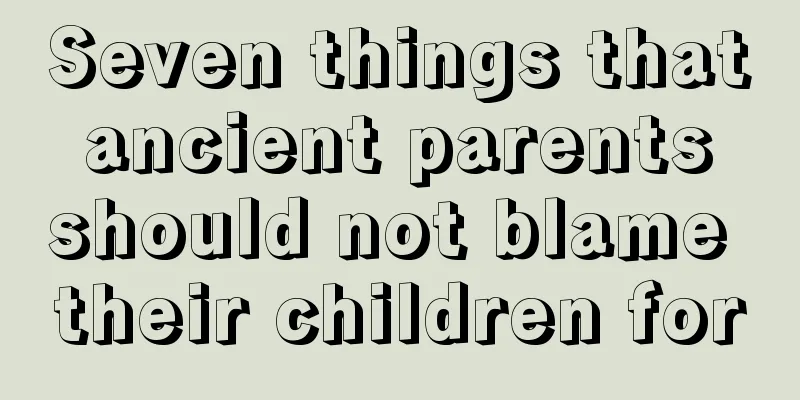Ways to improve children's memory

|
I believe everyone knows the importance of memory to us. If there is a problem with our memory, it will not only affect our study and work but also easily bring us great psychological pressure. Therefore, we recommend that our readers pay attention to their memory. The role of memory for children is even more obvious. Below we will introduce to you some methods to improve children’s memory. 1. Provide children with vivid, vivid, lively and emotionally charged memorization materials. Young children's memory is mainly unconscious. Most things that are intuitive, vivid, interesting, and can evoke strong emotional experiences in young children can be remembered naturally. Therefore, provide children with some colorful, concrete and infectious memorization materials so that the materials themselves can attract children and arouse their high attention. For example, you can provide the following memorization materials: interesting small cards of different shapes made of various materials, movable toys and real objects, etc. At the same time, efforts should be made to provide children with lively and popular games or puppet shows. Experiments have shown that this will better ensure that children gain a deep impression and enable them to easily memorize knowledge, thereby achieving the goal of improving memory effects and developing memory abilities. 2. Frequently give children specific and clear memory tasks, give correct evaluations to the memory results, and stimulate children's enthusiasm for conscious memory. The occurrence and development of conscious memory is the most important qualitative change in the process of children's memory development. In order to cultivate children's ability of conscious memory, in daily life and various organized activities, adults should often consciously propose specific and clear memorization tasks to children to promote the development of children's conscious memory. For example, when listening to stories, going out for a visit, or taking a walk after a meal, children should be given memorization tasks. If there are no specific requirements, children will not take the initiative to memorize. It is worth noting that when making clear and appropriate memory requirements to young children, timely affirmation and praise should be given to the children when they complete the memory tasks to improve their enthusiasm and initiative in memory. Experiments have shown that this will help young children to actively memorize better. 3. Help children understand the materials to be memorized and improve their level of meaningful memorization and cognitive ability. In the early childhood period, although children have more mechanical memory than meaningful memory, the effect of meaningful memory is better than that of mechanical memory. Research by many psychologists has shown that young children tend to remember things that are familiar and understood very well. It is very important to cultivate and develop children's intentional memory ability. To this end, it is necessary to use various methods to help children understand the materials to be memorized as much as possible. In actual practice, you can ask children some questions, such as "Why can birds fly?", "Why can ducks swim in water?", etc., to guide them to memorize through active thinking and based on understanding the meaning; for meaningless or impossible to understand materials, try to help children find the connection between their meanings; for some content that is not easy to remember but needs to be remembered in daily life, you can adopt the classification memory method. Experiments have shown that this can significantly improve children's memory. 4. Use multiple sensory organs to memorize. In order to improve the memory effect of young children, the method of collaborative memory can be adopted. That is, when young children are memorizing, multiple sensory organs are involved in the activities to establish multi-faceted connections in the brain. This is a way to deepen young children's memory. Experimental studies have shown that if young children are allowed to mobilize multiple senses such as eyes, ears, mouth, nose, and hands, leaving many traces of the "same meaning" in the cerebral cortex, and establishing multi-channel connections in the visual area, auditory area, olfactory area, motor area, language area, etc. of the cerebral cortex, the memory effect will definitely be improved. Therefore, young children should be guided to use multiple senses to participate in memory activities. If you want young children to feel the spring, you should try to take them to look, touch, smell and taste more, and gain perceptual knowledge from multiple aspects through multiple senses such as eyes, ears, hands, nose and mouth. Experiments have shown that this will help young children remember quickly and well. 5. Help children to review reasonably to enhance their memory. The characteristics of young children's memory are that they remember quickly, forget quickly, and are not easy to persist. Therefore, when guiding young children to memorize, a certain amount of repetition and review is very necessary. This is not only an important measure to improve children's memory, but also the best way to consolidate children's memory and improve their memory ability. Generally speaking, when letting children review and consolidate what they have learned, it is not appropriate to use monotonous, long-term repetitive stimulation. Instead, it should be done when the child is emotionally stable using a variety of interesting methods. Such as storytelling, reciting nursery rhymes, guessing riddles, performances, games and competitions, walks and outings, and daily life activities. Experiments have shown that this not only enables children to quickly consolidate the knowledge and skills they have learned in a relaxed and happy mood, but also stimulates their interest in memory and increases their enthusiasm for learning. In the above article, we introduced the importance of memory. We recommend that our readers should pay attention to their memory in their daily lives and pay attention to any memory problems. The above article introduces in detail methods to improve children’s memory. |
<<: Reasons for babies to have fever after receiving Japanese encephalitis vaccine
>>: Baby's reaction after DPT vaccination
Recommend
What causes fever and stomach pain in children?
Children are prone to fever when they catch a lit...
What to do about growing pains in children
Growing pains in children are a problem that many...
Nephrotic syndrome mortality in children
Many children suffer from pediatric kidney diseas...
What to do if your baby always drools
It is normal for babies to drool. At what stage d...
Diet therapy for recurrent tonsillitis in children
Tonsillitis is a common upper respiratory tract i...
Massage for children with cold
Children are the backbone of their parents and th...
Reasons and solutions for slow hair growth in babies
In fact, parents should be very concerned about t...
Do children need magnesium supplements?
The magnesium content in babies is relatively low...
Why does the child vomit after eating milk?
The birth of a baby makes the mother who has just...
Does a little boy need surgery for phimosis?
Phimosis is a common genital problem, which is ma...
What are the symptoms of teething in babies?
In fact, the teething period is really important ...
3 year old baby crying at night
It is normal for babies to cry, and there are man...
How to treat laryngeal wheezing in children? 6 treatment methods
The larynx of children is relatively weak and is ...
What are the symptoms of tracheitis in children
Bronchitis is very common in children, especially...
What is the standard for children's hypertension?
Many people think that only adults or the elderly...









